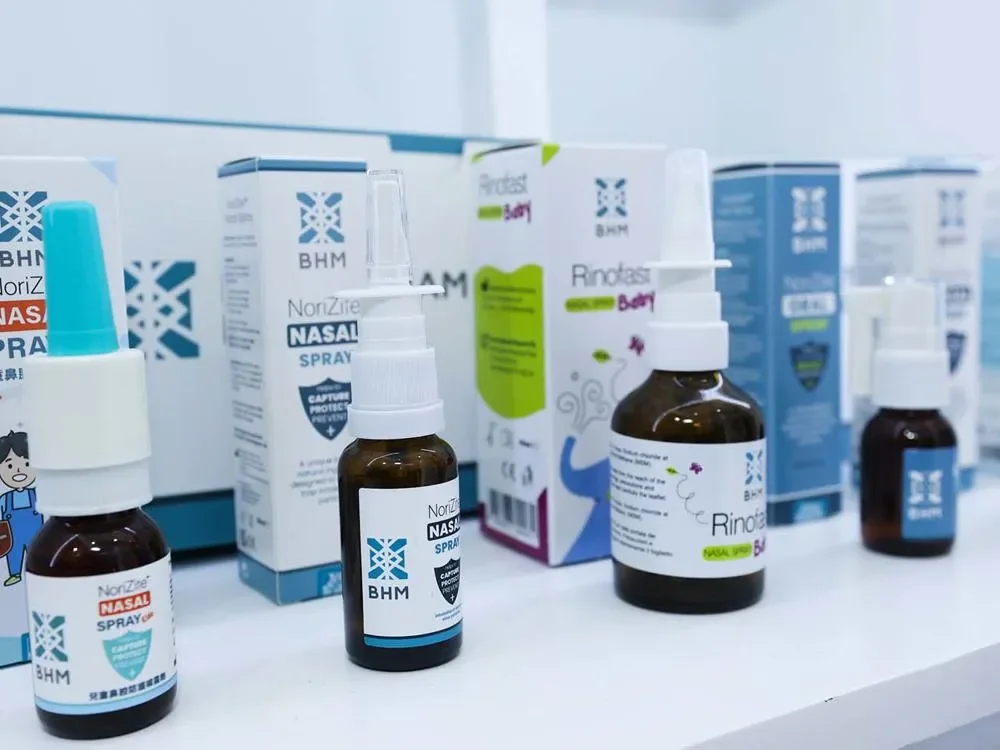A nasal spray based on pandemic innovation is now being reformulated as a drug-free nasal spray to prevent hayfever
When the COVID-19 pandemic hit in 2020, it triggered a global demand for rapid, life-saving innovations, a call to action for many medical researchers and startups.
In November 2020, the University of Birmingham announced the first published study showing a novel nasal spray could inhibit the COVID-19 virus in cell culture.
The formulation was engineered by Professor Liam Grover, from the University’s Healthcare Technologies Institute, and a team of researchers who collaborated on its testing. It is formulated with two compounds already approved by regulatory bodies in the UK, Europe and the US and widely used in medical devices, medicines, and food products – carrageenan, which binds viral particles, and gellan gum, which enhances retention in the nose. Together, they create a physical ‘liquid mask’ within the nose that could potentially prevent viral transmission.
Dr Richard Moakes and Professor Liam Grover discuss the novel nasal spray with BBC's David Gregory-Kumar.
But due to the pandemic context, the team at Birmingham Biotech – a startup focused on diagnostic tests and protective nasal and throat sprays – had to adopt a different approach. Traditional biotech pathways involving seed rounds, regulatory hurdles, and manufacturing timelines weren’t feasible. “Because of the urgency of preventing COVID from spreading, our priority was to get it to market as soon as possible,” says Michael Hsu, Managing Director at Birmingham Biotech.
As a strategic choice, the product was classified as a Class I medical device, enabling it to be launched quickly as a barrier-based preventive technology. “We call it a no-drug, barrier-based preventive technology,” says Mr Hsu.
Birmingham Biotech continues to work with Professor Grover’s team to commercialise their research. The company is located in Unit 9, a facility in the Birmingham Research Park that provides flexible support for med-tech startups to conduct experiments, proof-of-concept work, or prototyping.
“Being connected with a university gives us access to resources that would otherwise be unaffordable for a biotech startup. It’s an extension of our team that allows us to do things that typically only a big corporation could handle; it’s like being part of a larger ecosystem.”
University of Birmingham Enterprise and Birmingham Biotech co-own the intellectual property, and Birmingham Biotech licenses the rights for global commercialisation, while being advised by legal and patent experts at the university. “This partnership means that we don’t have to worry about the patent, the legal side, or the research, because the university can handle that,” says Mr Hsu. “My expertise is on the business side, so we can focus on what we do best; marketing the product.”
The antiviral nasal spray is now sold in more than 10 countries
Though initially born from the COVID-19 emergency response, the technology has much broader applications. The team at Unit 9 is now working on a new formulation for a drug-free nasal spray to prevent hay fever, designed to provide non-pharmaceutical relief for the condition, which affects as many as 13 million people in the UK. “The key to our technology is retention – keeping the treatment in the nose longer – which enables it to act as a foundation technology for other use cases,” says Mr Hsu.
“This means users won’t need to apply it as frequently, and the drug itself becomes more effective.” Beyond nasal sprays, the platform could be adapted for products treating issues in the eyes, the mouth, and other parts of the body. “Unit 9 gives us a lot of support for regularly modifying and improving our formulation,” says Mr Hsu.
Currently, the product is sold in more than 10 countries, with a strategic focus on China, Europe, and the US, followed by the Middle East. Close collaboration with the UK Department for Business and Trade is helping Birmingham Biotech connect with local partners in new regions.
The symbiotic relationship with Enterprise is at the heart of the company’s strategy. “As a startup, we’re small, we’re young, so we’ve had to adopt different approaches and make use of as many resources as possible to help us grow,” says Mr Hsu. “I also believe one of the key reasons we’ve been able to succeed is that we have good technology. That’s the foundation – whatever your business strategy is, if the product or the technology isn’t strong, it won’t work.”

